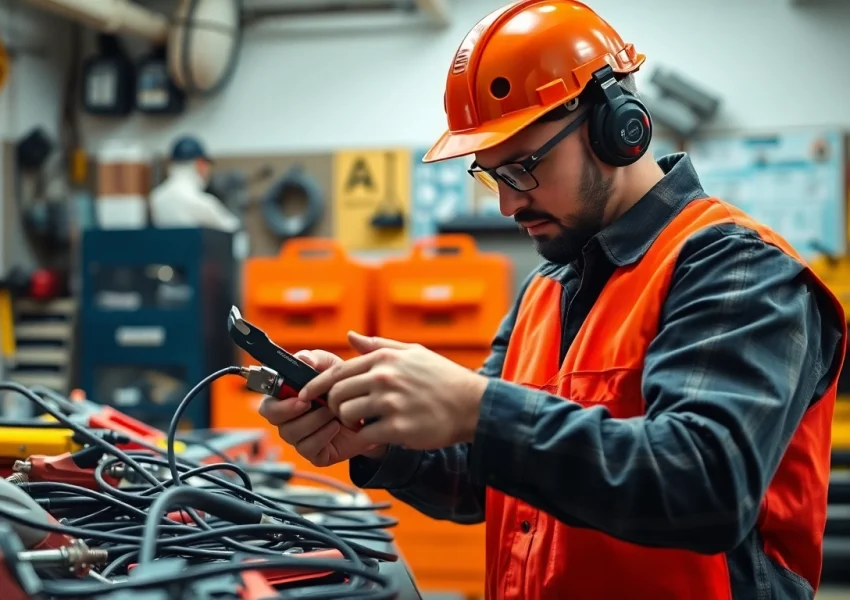Introduction to Construction Trade Schools in Texas
In Texas, the construction industry is booming, driven by robust economic growth and an ever-expanding infrastructure landscape. With this growth has come a notable demand for skilled labor in various construction trades. For individuals aspiring to enter this thriving field, construction trade schools in Texas provide essential education and training. These institutions equip students with the practical skills and theoretical knowledge necessary to succeed in diverse roles within the construction sector.
Understanding the Importance of Trade Education
Trade education plays a crucial role in preparing students for careers in specialized trades, including plumbing, electrical work, carpentry, and HVAC (heating, ventilation, and air conditioning). Unlike traditional four-year degrees, trade schools focus on hands-on learning, ensuring that students develop the specific skills required for their chosen careers. By emphasizing practical experience, these programs produce job-ready graduates who can meet the immediate needs of employers.
Overview of Career Opportunities in Construction
The construction sector encompasses a wide range of opportunities. Graduates of construction trade schools can pursue various roles, such as:
- Electricians
- Plumbers
- Carpenters
- HVAC Technicians
- Construction Managers
- Welders
Each of these roles requires specific skills and knowledge that are typically covered in trade school programs, making these institutions vital for workforce development.
Benefits of Attending a Trade School
Choosing to attend a trade school comes with numerous benefits:
- Shorter Duration of Study: Trade programs often last anywhere from a few months to two years, allowing students to enter the workforce sooner than those pursuing traditional degrees.
- Lower Cost: In comparison to four-year universities, trade schools are generally more affordable, significantly reducing student debt.
- Direct Job Placement: Many trade schools have partnerships with local businesses, leading to job placement opportunities shortly after graduation.
- Hands-On Experience: Students engage in practical training that prepares them to meet real-world challenges in the field.
Types of Programs Offered at Construction Trade Schools
Construction trade schools in Texas offer a variety of programs that cater to the diverse needs of the industry. Here’s a deeper look at the types of programs available:
Certifications and Diplomas in Construction Trades
Most construction trade schools provide certifications or diplomas that validate a student’s skills and knowledge in specific trades. Common certifications include:
- Journeyman and Master Electrician Certification
- Plumbing Certifications
- NCCER (National Center for Construction Education and Research) credentials
- OSHA Safety Certifications
These certifications not only enhance job prospects but also often lead to higher wages, as employers seek verified skills.
Hands-on Training vs. Classroom Instruction
Construction trade schools emphasize a combination of hands-on training and classroom instruction. While theoretical knowledge is important, the application of that knowledge through practical training is essential. Students typically participate in workshops, simulations, and actual fieldwork, which allows them to:
- Learn how to operate tools and equipment safely.
- Understand building codes and regulations.
- Develop problem-solving skills through real-world scenarios.
This blend of learning styles prepares students effectively for the demands of their future employers.
Popular Specializations in Construction Trades
Within the construction field, specialized trades provide focused career paths. Some of the most popular specializations include:
- Electrical Technology: Focusing on installation, repair, and maintenance of electrical systems.
- Plumbing: Covering residential and commercial plumbing systems, including gas and water supply.
- Carpentry: Involving the construction and repair of building frameworks and structures.
- Welding Technology: Teaching students to join metal parts using high-heat processes.
- HVAC Technology: Preparing students to control heating, air conditioning, and refrigeration systems.
By specializing, students can align their training with personal interests and market demand, increasing their employment opportunities.
Factors to Consider When Choosing a Construction Trade School
Selecting the right construction trade school is a critical step that can influence your educational and career outcomes. Consider the following factors when making your decision:
Location and Accessibility of the School
The geographical location of a trade school can significantly affect student experiences. Considerations include:
- Proximity to home.
- Accessibility via public transportation.
- Local job markets and partnerships with construction firms.
Schools located in areas of high construction activity often provide better job placement opportunities for graduates.
Costs and Financial Aid Options
The cost of attending a trade school varies widely based on location, program length, and institution reputation. Typical expenses might include tuition, materials, and fees.
Fortunately, financial aid options are available, including:
- Federal Pell Grants
- Student loans
- Scholarships specific to trade students
- Work-study programs
Researching financial aid options can help alleviate the burden of costs, allowing more students to pursue the education they desire.
Reputation and Industry Connections
The reputation of a trade school can directly impact your job prospects. A school with strong industry connections and positive feedback from former students is often more valuable. Some indicators include:
- Accreditations and institutional ratings.
- Partnerships with local construction companies.
- Alumni success stories and job placement rates.
Researching reviews and testimonials can help prospective students identify reputable programs that will serve their career goals well.
Success Stories: Graduates from Texas Construction Trade Schools
Every successful trade program is reflected through the achievements of its graduates. Numerous alumni of Texas construction trade schools have gone on to build successful careers in their respective fields.
Notable Alumni and Their Career Paths
Many graduates have excelled in their trades, becoming leaders in their industries. For instance:
- Jack Sanders: A graduate of Texas State Technical College, Sanders became a foreman overseeing large-scale construction projects.
- Lisa Chen: An electrician who started her own firm after completing her studies at Central Texas College, she is known for her innovative approaches to sustainable electrical solutions.
- Michael Ortiz: A plumbing technician whose expertise led him to create a successful business with multiple employees.
These examples illustrate how trade education empowers individuals to create thriving careers.
Impact of Technical Training on Job Performance
Trade education directly influences job performance. Graduates are typically better prepared for the workforce, possessing:
- Technical skills necessary for safety and efficiency.
- Soft skills such as communication and teamwork, which are crucial in collaborative work environments.
- A strong work ethic fostered through rigorous training programs.
Employers consistently report higher job satisfaction and productivity rates among graduates of trade programs.
Testimonials from Students
Current and former students often share positive feedback about their experiences:
“My time at [School Name] equipped me with everything I needed to land my first job as a plumber. The hands-on training was invaluable!”
“Attending the HVAC program at [School Name] changed my life. I had a job offer before graduation!”
Future Trends in Construction Training and Education
The landscape of construction trades is continually evolving. Future trends in education will be heavily influenced by technological advancements and changes in market demands.
Emerging Technologies in Construction Trades
Technological tools and methodologies are transforming how construction projects are approached. Some trends include:
- BIM (Building Information Modeling): This technology allows for better project visualization and management, requiring additional training for workers skilled in software programs.
- Drones: Used for surveying, drones are becoming commonplace, necessitating skills in operating and analyzing aerial data.
- 3D Printing: This emerging practice is being explored for building components, potentially changing traditional construction methodologies.
Trade schools are beginning to integrate training on these technologies into their programs to keep students competitive in the job market.
Shift towards Sustainable Building Practices
As the world becomes more conscious of environmental impacts, construction trades will increasingly focus on sustainable practices. Key areas include:
- Energy Efficiency: Training on modern materials and techniques that enhance energy conservation.
- Recycling and Waste Management: Educating students on minimizing waste and using recyclable materials in construction.
- Green Certifications: Programs preparing students for LEED (Leadership in Energy and Environmental Design) certifications.
Demand for professionals skilled in sustainability will grow, making these courses essential for future tradespeople.
The Growing Demand for Skilled Trades in Texas
Recent trends indicate a substantial increase in demand for skilled tradespeople in Texas, driven by:
- Population growth leading to new housing and infrastructure projects.
- Retirement of veteran workers, creating vacancies.
- Increased investment in infrastructure repair and upgrades.
Trade schools will play a pivotal role in meeting this demand, fostering a new generation of skilled workers positioned to take advantage of these opportunities.
Conclusion
In summary, construction trade schools in Texas serve as invaluable resources for aspiring tradespeople. By providing focused education and hands-on training, these institutions play a vital role in shaping the future of the construction workforce. With a variety of programs and a strong connection to industry needs, trade schools are poised to continue meeting the demands of an evolving job market. Whether you’re looking to become an electrician, plumber, or carpenter, pursuing a career path through a trade school can lead to substantial professional success and personal fulfillment.






